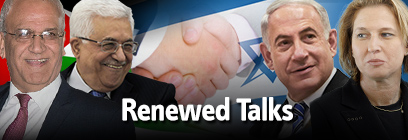
Palestinian President Mahmoud Abbas said on Wednesday his peace negotiators had resigned over the lack of progress in US-brokered statehood talks clouded by Israeli settlement building.
The development would mark a new low point for the talks with Israel that resumed in July and which officials from both sides have said have made little headway.
Related stories:
- Abbas warns construction will lead to explosion
- Behind the scenes of Israeli-Palestinian peace talks
- Kerry warns of violence if peace talks fail
In an interview with Egyptian CBC television, Abbas suggested the negotiations would continue even if the Palestinian peace delegation stuck to its decision.
"Either we can convince it to return, and we're trying with them, or we form a new delegation," he said.
It was unclear from Abbas's interview when the Palestinian negotiators had quit, but Abbas said he would need about a week to resume the talks.
In a statement to Reuters TV on Wednesday, chief Palestinian negotiator Saeb Erekat did not elaborate on the report of his resignation, but said the sessions with Israel were frozen.
"In reality, the negotiations stopped last week in light of the settlement announcements last week," he said.
Since the talks got underway after a three-year break, Israel has announced plans for several thousand new settler homes in the occupied West Bank and east Jerusalem.
The disclosure on Wednesday that Israel's Housing Ministry had commissioned separate plans for nearly 24,000 more homes for Israelis in the two areas raised US concern and drew Palestinian condemnation.
Prime Minister Benjamin Netanyahu, an advocate of settlement construction, intervened late on Tuesday, ordering a halt to the projects and saying he had no prior knowledge of them.
Netanyahu said he feared such settlement activity could trigger an international outcry that would divert attention from Israel's lobbying against a deal between world powers and Iran that would ease economic sanctions on Tehran without dismantling its nuclear-enrichment capabilities.
Nuclear talks resume in Geneva on Nov. 20. Israel, widely believed to be the Middle East's only nuclear power, accuses Iran of pursuing atomic weapons. Iran says its nuclear programme has only peaceful purposes.
Settlement push
A statement announcing Netanyahu's move made no mention of the Palestinians or the land-for-peace negotiations. Most countries say Israeli settlements built in areas captured in the 1967 Middle East war are illegal.
But Israeli Energy Minister Silvan Shalom, a member of Netanyahu's right-wing Likud party, made clear on Wednesday that Israel would continue settlement building, while being more careful in the future about announcing it.
"The question is always about the timing. Is the timing right? Is the timing wrong?" Shalom told Israel Radio. "We need the support of the United States on the Iranian issue and have to do our utmost to lower any tensions with it."
Erekat said through its settlement activity, Israel was trying to destroy US Secretary of State John Kerry's diplomatic efforts to achieve a peace deal.
- Receive Ynetnews updates
directly to your desktop















